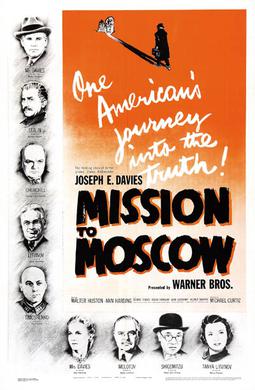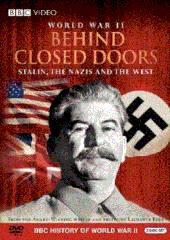
The Tehran Conference was a strategy meeting of Joseph Stalin, Franklin D. Roosevelt, and Winston Churchill from 28 November to 1 December 1943. It was held at the Soviet Union's embassy at Tehran in Iran. It was the first of the World War II conferences of the "Big Three" Allied leaders and closely followed the Cairo Conference, which had taken place on 22–26 November 1943, and preceded the 1945 Yalta and Potsdam conferences. Although the three leaders arrived with differing objectives, the main outcome of the Tehran Conference was the Western Allies' commitment to open a second front against Nazi Germany. The conference also addressed the 'Big Three' Allies' relations with Turkey and Iran, operations in Yugoslavia and against Japan, and the envisaged postwar settlement. A separate contract signed at the conference pledged the Big Three to recognize Iranian independence.

Vyacheslav Mikhaylovich Molotov was a Russian and later Soviet politician and diplomat, an Old Bolshevik, and a leading figure in the Soviet government from the 1920s onward. He served as Chairman of the Council of People's Commissars from 1930 to 1941 and as Minister of Foreign Affairs from 1939 to 1949 and from 1953 to 1956.

The Yalta Conference, held 4–11 February 1945, was the World War II meeting of the heads of government of the United States, the United Kingdom and the Soviet Union to discuss the postwar reorganization of Germany and Europe. The three states were represented by President Franklin D. Roosevelt, Prime Minister Winston Churchill, and General Secretary Joseph Stalin. The conference was held near Yalta in Crimea, Soviet Union, within the Livadia, Yusupov, and Vorontsov palaces.

William Averell Harriman, better known as Averell Harriman, was an American Democratic politician, businessman, and diplomat. He founded Brown Brothers Harriman & Co., served as Secretary of Commerce under President Harry S. Truman, and was the 48th governor of New York, as well as a candidate for the Democratic Party nomination for president in 1952 and 1956. Throughout his career, he was a key foreign policy advisor to Democratic presidents.

Western betrayal is the view that the United Kingdom, France, and sometimes the United States failed to meet their legal, diplomatic, military, and moral obligations with respect to the Czechoslovak and Polish states during the prelude to and aftermath of World War II. It also sometimes refers to the treatment of other Central and Eastern European states at the time.

The Casablanca Conference or Anfa Conference was held in Casablanca, French Morocco, from January 14 to 24, 1943, to plan the Allied European strategy for the next phase of World War II. The main discussions were between US President Franklin Roosevelt and British Prime Minister Winston Churchill. Stalin could not attend. Key decisions included a commitment to demand Axis powers' unconditional surrender; plans for an invasion of Sicily and Italy before the main invasion of France; an intensified strategic bombing campaign against Germany; and approval of a US Navy plan to advance on Japan through the central Pacific and the Philippines. The last item authorized the island-hopping campaign in the Pacific, which shortened the war. Of all the decisions made, the most important was the invasion of Sicily, which Churchill pushed for in part to divert American attention from opening a second front in France in 1943, a move that he feared would result in very high Allied casualties and not be possible until 1944.

Mission to Moscow is a 1943 propaganda film directed by Michael Curtiz, based on the 1941 book by the former U.S. ambassador to the Soviet Union, Joseph E. Davies.
Laurence Rees is an English historian. He is a BAFTA winning historical documentary filmmaker and a British Book Award winning author of several books about Adolf Hitler, the Nazis and the atrocities committed, especially by them, during the 20th century. He is the former Head of BBC TV History Programmes.

The Provisional Government of the Republic of Poland was created by the State National Council on the night of 31 December 1944.
The First Moscow Conference of World War II took place from September 29, 1941 to October 1, 1941.
The Second Moscow Conference between the major Allies of World War II took place from August 12, 1942, to August 17, 1942.
The Fourth Moscow Conference, also known as the Tolstoy Conference for its code name Tolstoy, was a meeting in Moscow between Winston Churchill and Joseph Stalin from 9 October to 19 October 1944.

The percentages agreement was a secret informal agreement between British Prime Minister Winston Churchill and Soviet leader Joseph Stalin during the Fourth Moscow Conference in October 1944. It gave the percentage division of control over Eastern European countries, dividing them into spheres of influence. It is also known as the naughty document, a nickname coined by Churchill himself due to his concerns regarding American reaction to any deal with such strong imperialist undertones, although in reality U.S. President Franklin Roosevelt was consulted tentatively and conceded to the agreement. The content of the agreement was first made public by Churchill in 1953 in the final volume of his memoir. The US ambassador Averell Harriman, who was supposed to represent Roosevelt in these meetings, was excluded from this discussion.

The Polish Resettlement Act 1947 was the first ever mass immigration legislation of the Parliament of the United Kingdom. It offered British citizenship to over 250,000 displaced Polish troops on British soil who had fought against Nazi Germany and opposed the Soviet takeover of their homeland. The act also supplied a labour force to the demands of war-torn Britain.

Aleksei Vasilyevich Petrenko was a Soviet and Russian film and stage actor. He played Grigori Rasputin in Elem Klimov's historical drama Agony and Joseph Stalin in the BBC Two documentary World War II: Behind Closed Doors.
Basis Nord was a secret naval base of Nazi Germany's Kriegsmarine in Zapadnaya Litsa, west of Murmansk provided by the Soviet Union. The base was part of a partnership that developed between Germany and the Soviet Union following German-Soviet Non-Aggression treaty of 1939, along with a broad economic agreement of 1940.

Falsifiers of History was a book published by the Soviet Information Bureau, edited and partially re-written by Joseph Stalin, in response to documents made public in January 1948 regarding German–Soviet relations before and after the Molotov–Ribbentrop Pact.
Sir Owen St Clair O'Malley was a British diplomat. He was Minister to Hungary between 1939 and 1941. He was British ambassador to the Polish government in exile in London during World War II. From July 1945 until May 1947, he was Ambassador to Portugal.

World War II: When Lions Roared is a 1994 American war television miniseries, directed by Joseph Sargent, and starring Michael Caine, John Lithgow and Bob Hoskins as the three major Allied leaders, Joseph Stalin, Franklin D. Roosevelt and Winston Churchill respectively. It was notable as the first video production to be produced in high-definition video for broadcast in the United States, using the Sony HDVS line of analog high-definition equipment, although it was broadcast by the NBC television network in standard NTSC resolution.
March 1940 was the third month of that leap year. It began on a Friday and ended after 31 days on a Sunday












